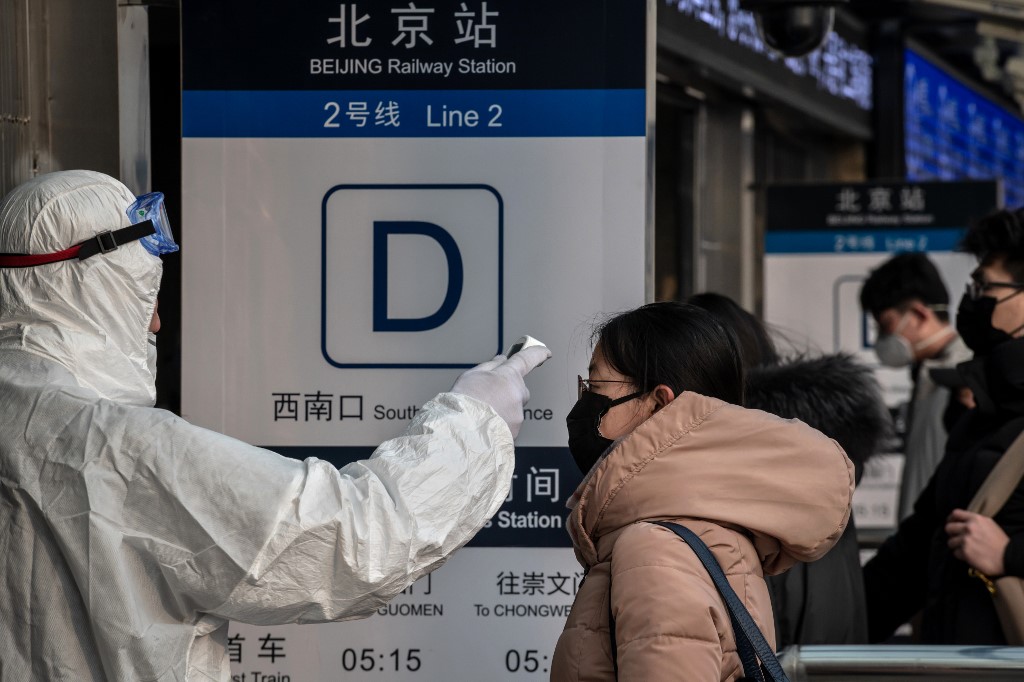At the risk of incurring the wrath of my compatriots, I recommend a pause in America’s finger-pointing at China for its delay in reporting the Covid-19 epidemic and its alleged falsification of infection and death rates.
China did a great deal wrong, especially at the outset of the epidemic, and it has admitted as much by offering a “solemn apology” to the family of Dr Li Wenliang, the brave Wuhan physician whose warnings were muzzled by provincial authorities and who subsequently died of the virus. What China did right starting in late January, though, should be the West’s Sputnik moment.
In my forthcoming book You Will Be Assimilated: China’s Plan to Sino-Form the World, I report on China’s ambition to become the world’s preeminent force in digital healthcare, perhaps the single biggest economic trend of the 21st century. Given the urgency of the present situation I preview some of the book’s content below.
The zero infection rate reported for several days in mid-March appears to have excluded some 1,500 asymptomatic cases. Beijing well may have underreported the death toll in Wuhan, a city that the central government sacrificed to isolate the epidemic, and where (as Asia Times has reported) public anger at the government remains high.
All that is of minor consequence. China stopped the epidemic by combining conventional public health measures with the largest application of information technology to public health in history, including locational tracking of likely carriers, identification of probable nodes of infection, continuous monitoring of the vital signs of a large proportion of its 1.4 billion people, and the use of smartphone apps to regulate the quarantine of individuals. Huawei has spent years positioning itself to be a dominant force in medical applications of information technology, with some competition from China’s other tech giants, including Alibaba and Tencent. The Covid-19 pandemic gave China the opportunity to show what it can do, and the results are startling – so startling that every major European pharmaceuticals company is angling to be part of the perceived Next New Thing in healthcare.
China was able to marshal so many digital resources against Covid-19 because it has invested massively in big data, artificial intelligence and other information technology resources in the healthcare field over the past decade. These range from digitized health records – something that Google tried to do but abandoned due to American privacy laws – to smartphone attachments that read vital signs and take EKG’s, smartphone apps that transmit these vital signs to the cloud in real time, DNA sequencing on a vast scale, remote surgery using virtual reality headsets over 5G mobile networks, and artificial intelligence applications to diagnostics and drug development.
Chinese data scientists combined the vast amount of health information already available with locational data from smartphones and the results of widespread forensic Covid-19 testing to identify risks down to the level of individuals in a population of 1.4 billion people. In this sort of exercise the whole is greater than the sum of the parts. Covid-19 test results are often inaccurate, but if the medical authorities receive real-time information about the body temperature, heart rate and blood oxygen levels of a very large sample of the population, they can interpret them with far greater accuracy.
Smartphone apps
Smartphone apps played an important role in obtaining information as well as controlling individual behavior. The Chinese state news service Xinhua reported February 15 that the e-commerce giant Alibaba rolled out a smartphone-based “Skynet” in 100 Chinese cities within a week. According to Xinhua, “On February 15, the e-government office of the General Office of the State Council instructed Alipay and Alibaba to accelerate the development of an epidemic prevention and control health code system, for a national integrated government service platform. Subsequently, Sichuan, Zhejiang, and Hainan achieved full province coverage. A ‘Skynet’ of digital epidemic prevention is being rolled out at speed throughout China, and Alipay Health Code has become the standard of digital epidemic prevention.”
An American byword for a fool is someone who brings a knife to a gunfight. Some Americans have brought not a knife, but a bullhorn. President Trump isn’t among them. He told reporters April 2, “The relationship with China is a good one, and my relationship with [Xi Jinping] is really good.” Asked about reports that US intelligence thinks that China falsified coronavirus data, the president said, “I’m not an accountant from China.”
But half the Republican senators and the whole of the Republican punditeska have issued ritual denunciations of Chinese lies, following yesterday’s leak of US intelligence reports claiming that China falsified Covid-19 data. The Hudson Institute, a Washington think tank close to the Trump Administration, entitled its daily note “Combating China’s Covid-19 propaganda offensive to undermine the United States on the global stage.”
But this isn’t a “propaganda offensive.” It’s a technological paradigm shift. Chinese propaganda as usual is crude, culturally myopic and unpersuasive. But China’s accomplishments in public health are real, according to the world’s largest pharmaceuticals firms. On March 30, for example, the German pharma industry leader Boehringer-Ingelheim announced the opening of a second digital laboratory in Shanghai. A company statement explained, “The concept of BI X is to use digital innovation to accelerate the development of healthcare solutions and to help discovery of breakthrough treatments for humans and animals. Since its start in 2017, BI X has delivered many projects with a strong impact worldwide. Using iterative processes and continuous development, Scrum Masters, Data Scientists, Engineers and UX Designers working at BI X test and prove new applications within months.”
Michael Schmelmer, a member of Boehringer-Ingelheim’s board, added, “With this step we are strengthening our footprint in a market that is very strong in digital innovation in healthcare and has a unique technological landscape. The close proximity to our Chinese patients and customers will enable us to develop better disruptive products for them and tap into the high digital capabilities in China.” The company has annual sales of over US $20 billion.
Merck signed a digital technology deal with the Chinese computing giant Tencent a year ago. As the firm announced at the time, “Merck and Tencent will create intelligent digital healthcare services, thereby increasing public knowledge of diseases and improving patients’ understanding of disease symptoms and effective treatment options to better manage chronic diseases. The focus areas will include all treatment areas of Merck’s Healthcare business in China such as allergies, infertility, diabetes, thyroid disorders and cardiovascular diseases, as well as oncology such as metastatic colorectal cancer (mCRC).”
The company added, “In the future, Merck and Tencent will continue to extend the scope of collaboration to other areas such as exploring the use of innovative medical service models based on ‘A.I. doctors’ to provide more comprehensive disease awareness education and treatment services for mCRC and other diseases.”
Cloud-based healthcare solution
Huawei, the world’s largest telecommunications equipment firm, has spent years developing AI applications to health care. In 2017 it signed a joint venture with the Dutch electronics firm Philips “to build a new, cloud-based healthcare solution for deployment in China,” Healthcare magazine reported. “The country is becoming home to an increased aging population and limited resources, which has seen the need for the healthcare industry to become increasingly digital and patient centric. The use of digital technologies will therefore deliver increased accuracy within diagnostics and analytics and enable the ability for medical professionals to provide exceptional medical treatment surrounding chronic, long-term condition. Testing surrounding Huawei and Phillips’ healthcare solution has now been completed, at which the project is now looking towards a future where cloud and machine-learning will digitalize and disrupt the healthcare vertical with unprecedented speed and reach.”
In an October 2019 interview, Huawei’s Chief Technology Officer Paul Scanlan told me, “This is what we mean by the ‘control point.’ We don’t want to do everything ourselves. If you are a pharmaceutical company, you won’t have to duplicate our investment in AI. You simply rent time on the Cloud using our AI servers and obtain access to our data. The key is gathering and porting the data to servers where it can be put into usable form. That’s our contribution. We don’t want to control everything. We want partners who are best in class in every field. “
By providing the medical data and the capacity to manipulate it, China has become a magnet for the world’s leading pharmaceutical firms.
China has had years to prepare for this sort of crisis. In 2015, I toured Huawei’s headquarters in Shenzhen, and saw a 12-by-12-foot map of Guangzhou City with countless small lights. Each of these denoted a smartphone, a Huawei official explained, and the company’s data scientists could tell you the foot traffic at the site of a prospective new fast-food restaurant. At the time, Huawei could match smartphone location to social media posts and online purchases. During the past several years the Chinese government has combined smartphone locational data with facial recognition, making it easy to verify that the person carrying the phone is the registered user.
Singapore, South Korea and Israel also use smartphone tracking, mobile phone apps and other digital technology to control the movements of possible virus carriers.
























